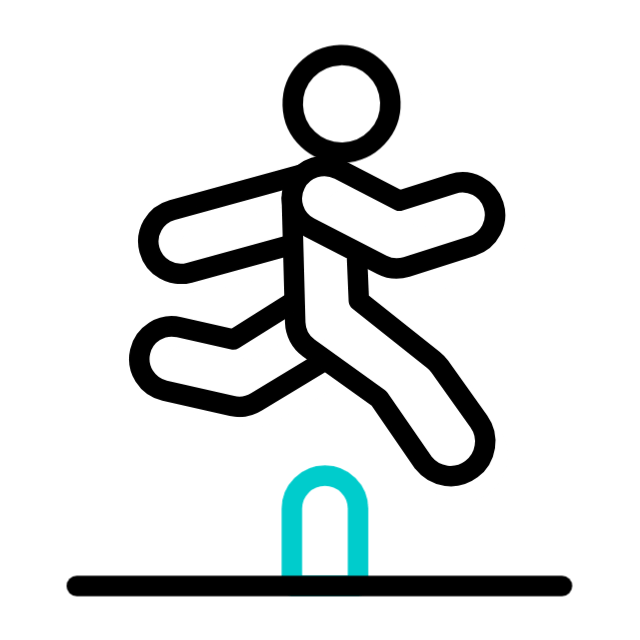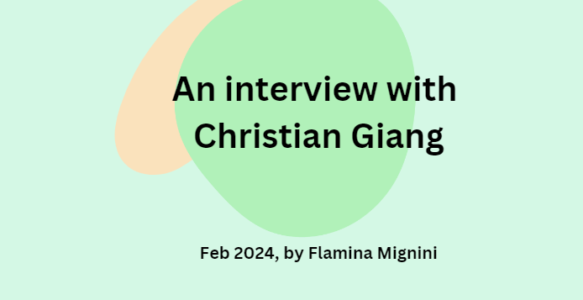Christian Giang started with an electrical engineering degree at ETH Zürich and is now the CTO and co-founder of Combat IQ, a combat sports data analytics company.
Christian’s career path was far from linear.
In this period of time he was getting more interested and involved in robotics, and though the lab wasn’t his favorite place to be, it offered him insight into development and real life applications, and the impact that such research had on people’s lives. He had the opportunity to dip his toes in the biomedical engineering field, which he found to have an interest in. After having done a small project in that direction at ETH, he completed his Master’s thesis during his exchange semester at EPFL, in Prof. Silvestro Micera’s laboratory.

The biomedical field
His role was to develop an adaptive algorithm for upper-limb motor recovery of post-stroke patients, using a robotic exoskeleton (rehabilitation robotics). The algorithm for the training, which automatically adapts to the patient, makes the training harder as soon as some improvement in the motor performance is recorded.
Christian had to commute to the hospital (HUG), where a few older patients, who had suffered a stroke, would undergo training and rehabilitation. The goal was to see if there would be benefits to using the robot instead of conventional therapy only. The research has proven to be challenging, being dependent on individual parameters, sample sizes and patient cooperation. For instance, the rates at which patients adapted to the training were different. As for small sample sizes, the issue was worked around by recruiting healthy individuals and changing the program to make them learn new movements. Despite the research being fulfilling and interesting, Christian felt others might be better suited for this type of work.
Once he obtained his degree in robotics, he wasn’t sure which direction to take. He started by applying to PhD positions (related to bioengineering, sleep research for instance), both in Lausanne and in Zürich. He also had applied for industrial positions at that time, such as for ABB. But one thing that made him hesitate to take on the job was that he ideally wanted to stay in Lausanne, though finding a job there proved to be more challenging.

The educational field
One day while on vacation with friends, he catches a glimpse of a post about a collaboration between EPFL and SUPSI, on robotics applied to education. Having always had a very broad spectrum of interests, Christian had dabbled in education before, both with tutoring and in workshops. They required him to know Italian and French, the former which he did not know well at that point, his only experience with it having an Italian roommate. He applied nonetheless, passed several tests and eventually was invited to Lugano, where he started teaching in French.
“I let those interests guide me a bit in life.”
His supervisor spoke to him in Italian and Christian would respond in French. Being able to understand Italian and communicate efficiently, he got the position. He therefore ended up carrying out his PhD at EPFL’s MOBOTS group, under the supervision of Prof. Francesco Mondada and Prof. Alberto Piatti. The goal was to make activities, using robotics, that could be used in the context of a classroom.
“Best PhD ever! I was very lucky with my supervisors.”
After concluding his PhD, he started applying for industrial positions again in Lausanne, where his then partner (and now soon-to-be wife!) was staying as well. He found a post-doc position at a then new lab, ML4ED. The education he had worked on up until that point was catered to young children. Whereas ML4ED targeted vocational students, and required more machine learning than robotics. At that time he did not have a strong machine learning background. Thankfully, Prof. Tanja Käser assured him that it would not have been a problem and that he could learn on the go, which is exactly what he did.
“Now, how on earth did he get into sports analytics?” one might ask.

The sports analytics field
Having been trained in Karate competitively since he was young, he did his best to keep training during his Bachelor’s, at a more leisurely pace. Eventually, he felt an important part of his life was missing. During the pandemic, as it became common to do so, he gave a try to freelancing. The first job he got was transcription, which he described as : “boring and poorly paid but that you need to do to build your profile”. After this absolutely “captivating” first job he stumbled on this random guy from Canada who wanted to analyze fights, who is now the CEO and cofounder of the company, Tim Malik. Once more, Christian felt this was something he really wanted to pursue and went for it. After working on this project for a while, they both decided to create a startup.
For a while at the very start, in summer 2021, it was just the two of them, not getting paid much. The next year, they met in person and decided to take the classical path of applying for programs. They took on an incubator program in London, a very intense 3 month long training and a bit of funding to start outsourcing some tasks such as design projects and flights. However the most important element of this program was the network that they built in that environment.
Networking

Two people who are now part of his company today, he met there when they had their own companies. And by getting to know more and more people, it led to meeting investors. Sometimes having to go through very long chains of people and connections to reach the person you actually needed to meet, such as a mentor. With the funding they had they could start paying themselves a little but mostly their first employees. As there is more funding, the company grows at a very fast rate.

Side Quest
Host : “If you think you are too small to make a difference, try sleeping with a mosquito.” This is an African proverb quoted by the Dalai Lama. You have used this quote in your PhD Thesis paper. Should we aim to be more like mosquitoes? Small yet annoying?
Christian : That’s a good perspective on that, and I didn’t think about that when I used this quote. I used it because I found it to be relatable. Have you never slept with a mosquito in the room?
H : Oh, I have unfortunately. I know them all too well.
C : They’re annoying but they probably have their right of existence and their importance in the ecosystem.
H : Good point. I also have to ask how, why and where you have learned 7 (!!) languages. [said languages, for reference : German, Vietnamese, French, Italian, English, Spanish, Portuguese, and a bit of Hebrew]
C : Let me explain. It won’t seem that crazy once I tell you how. I grew bilingual, my parents are Vietnamese and I was born in Germany. In school I learned English and French. So that makes it four. Obviously I like languages, it’s not a mystery. And since I grew up with two very difficult languages, next to them Romance languages had a simple grammatical structure and pronunciation.
Also, if I were to estimate myself, I’m a B2/C1 level for many of these languages, so my goal when I learn them isn’t to become a renowned writer but rather to be able to hold conversations.
H : I’d say it’s more than conversation, you teach in Italian!!
C : I do, but still make some mistakes or forget some words.
H : Sounds like you’re fluent to me…
C : Then what happened was before going to ETH, right after finishing high school I spent a year in Costa Rica. And knowing French, I found learning Spanish to be quite easy. I learnt Italian with my roommate and at SUPSI and Portuguese from my fiancée who is Brazilian. People might think I learn just by talking to people but I do take courses, and I set the level at B1 from the get go.
H : Doesn’t it get confusing after a while?
C : Yes, a lot of false friends! People understand anyway from the context usually. The one language that stands out a bit is Hebrew, which I learnt during my exchange in Israel, but it’s rusty now.
H : Does knowing this many languages have an impact on the way you critically think?
C : It helps for sure. It makes me more flexible, having to switch between languages fast. Might also protect against Alzheimer’s.
H: Yes, so I’ve heard. As is customary, I have to ask for some words of encouragement.
C : It’s important to enjoy what you’re doing. Oftentimes we forget that. We have a lot of workload and sometimes it can be stressful, but we have to remind ourselves why we are doing it, and most of the time it’s because we want to! And though it’s good to pursue things and not fear change, it’s always good to have backup plans and not put all your eggs in one basket. And try to keep having diverse interests and hobbies, aside from studying!
H : Thank you for the advice!
